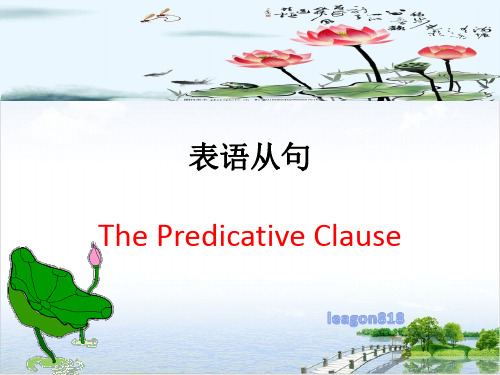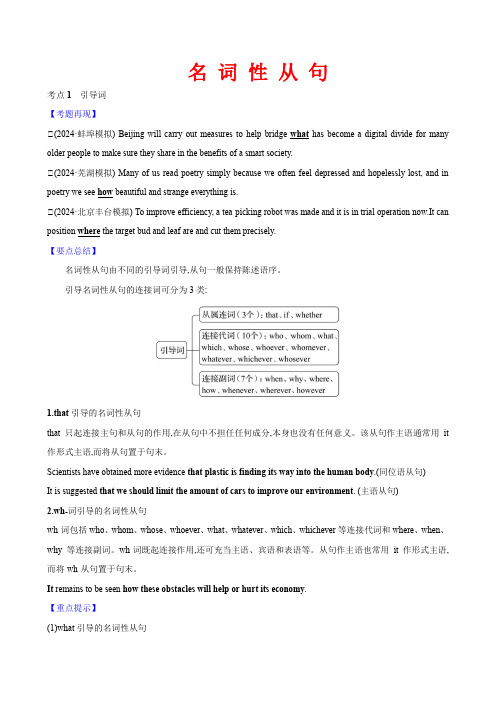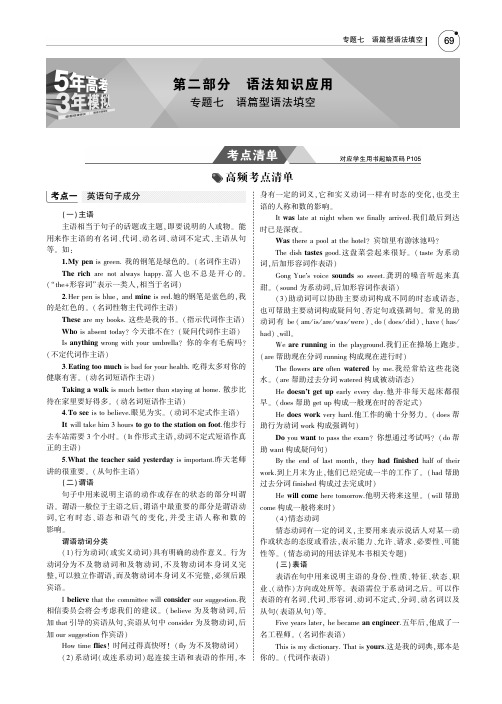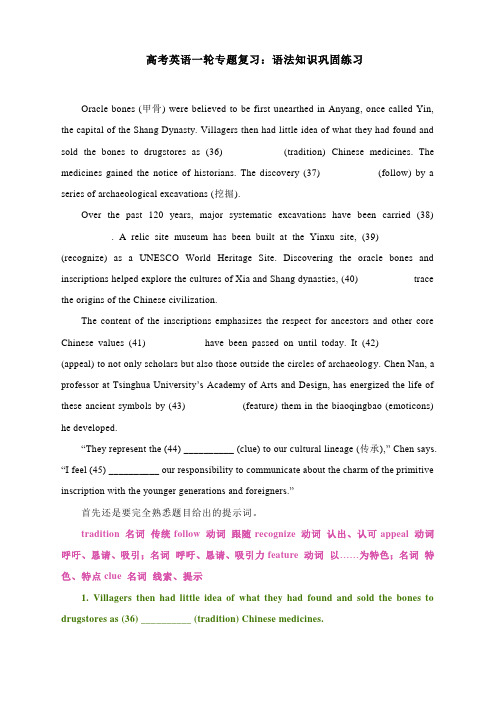高考英语第一轮复习(语法)【高考推荐】
2024届高考一轮复习英语语法专练课件(人教版):定语从句

在复合句中,修饰某一名词、代词或整个主句的从句叫定语从句。 被修饰的名词或代词叫先行词,引导定语从句的词叫关系词,定语从句 放在先行词的后面。
考点精讲一——关系代词引导的定语从句
情景导入
A real friend is someone who① walks in when the rest of the world walk out.A real friend is someone whose② support we can count on.A real friend is someone who① sees our true self , not just the face who/whom/that③ we show to the world.Yet these days,the modern tools that keep us connected are eating away at the meaning of friendship.We may be able to make many friends online,but these friendships can be quite shallow.Social media like blogs has come between us and the friends who/whom/that③ we love.
4.引导非限制性定语从句时as与which的区别
关系词
位置不同
表意不同
既可以放在主句前,也 意为“正如……”,后面的谓语动
as 可以放在主句后,有时 词多用see,know,expect,say,
还可插入主句中
mention,report等
which 通常放在主句之后
表语从句高考英语一轮复习语法讲解18张PPT

• 昨天晚上他没有去看电影, 那是因为他得帮助 She has remained where I stood yesterday for an hour.
that we can get It sounds as if someone is knocking at the door.
• Africa is a big continent.非洲是个大洲。 • 2.表语从句:指一个句子作为表语,说明主
语是什么或者怎么样。
• His suggestion is that we should stay calm. • 他的建议是,我们应该保持冷静。
二、表语从句的结构
• 1.表语从句的结构:关联词+简单句 • 主语+连系动词+关联词+简单句 • 2.可接表语从句的连系动词有be, become,
精编优质课PPT表语从句高考英语一轮 复习语 法讲解 18张PP T(获奖 课件推 荐下载 )
精编优质课PPT表语从句高考英语一轮 复习语 法讲解 18张PP T(获奖 课件推 荐下载 )
四、表语从句与宾语从句的区别
• 1.宾语从句的that常可省略,宾语从句的that不可省略。 • I believe(that)you have done your best and that things
他的妹妹做作业。(第一句话说明结果, 第二句 我的建议是我们明天一早就出发。
精编优质课PPT表语从句高考英语一轮复习语法讲解18张PPT(获奖课件推荐下载)
话说明原因) what we can get
there where D.
高考英语一轮复习语法知识必备:07.名词性从句

名词性从句考点1引导词【考题再现】①(2024·蚌埠模拟) Beijing will carry out measures to help bridge what has become a digital divide for many older people to make sure they share in the benefits of a smart society.①(2024·芜湖模拟) Many of us read poetry simply because we often feel depressed and hopelessly lost, and in poetry we see how beautiful and strange everything is.①(2024·北京丰台模拟) To improve efficiency, a tea-picking robot was made and it is in trial operation now.It can position where the target bud and leaf are and cut them precisely.【要点总结】名词性从句由不同的引导词引导,从句一般保持陈述语序。
引导名词性从句的连接词可分为3类:1.that引导的名词性从句that只起连接主句和从句的作用,在从句中不担任任何成分,本身也没有任何意义。
该从句作主语通常用it 作形式主语,而将从句置于句末。
Scientists have obtained more evidence that plastic is finding its way into the human body.(同位语从句)It is suggested that we should limit the amount of cars to improve our environment. (主语从句)2.wh-词引导的名词性从句wh-词包括who、whom、whose、whoever、what、whatever、which、whichever等连接代词和where、when、why等连接副词。
高考英语一轮复习 语篇型语法填空 PDF版含答案

词短语作表语)
克㊂ ( 介词短语作后置定语)
原因㊂ ( 表语从句作表语)
桥是去年冬天重建的㊂ ( 过去分词作定语) ( 过去分词短语作后置定语) 了㊂ ( 现在分词作定语) 语)
承受者㊂ 英 语 中, 及 物 动 词 ( 或 相 当 于 及 物 动 词 的 动 词 短 语) ㊁介词须带宾语㊂ 可以充当宾语的有名词㊁ 代词㊁ 动词不 定式㊁动名词㊁名词化的形容词以及从句( 宾语从句) 等㊂ 京㊂ ( 名词作介词的宾语) I am reading a book. 我在看书㊂ ( 名词作动词的宾语) I������m going to Beijing with my father. 我计划和我父亲去北 Yesterday, Tom������s mother looked after him at home. 昨天汤 What would you like? 你想要什么? ( 疑问代词作动词 Yesterday my father bought me a new bike. 昨天我父亲给 We got lost and couldn������t find each other. 我们迷路了,彼此 I like to play basketball. 我喜欢打篮球㊂ ( 不定式作动词
上那座山㊂ (it 作形式宾语,动词不定式短语作真正的宾语) ( 动名词短语作动词 enjoy 的宾语) ( 五) 补语
I think it impossible to climb the mountain. 我认为不可能爬 I enjoy listening to music very much. 我非常喜欢听音乐㊂ 在英语中,需要在一些及物动词的宾语后加上一个补足
������������������������������������������������������������������������������������������������������������������������������������������������������������������������������������������������������������������������������������������������������������������������������������������������������������������������������������
高考英语一轮复习英语语法专题复习名词性从句讲解教学课件-PPT

真题解析
His presentation will show you contexts. A. that you have observed B. that how you have observed C. how that you have observed D. how what you have observed
模拟题解析
As they usually receive the same score in standardized
examinations, there is often disagreement as to
is the
better student, Bob or Helen.
A. which
better student, Bob or Helen.
A. which
B. who
C. whom
D. whose
【解析】句意为“因为鲍勃和海伦在考试中总是得到同样的分数, 所以关于他们俩谁是更好的学生,总是有分歧”。
宾语从句 Object Clause
(2) 宾语从句的位置: a. 放在主句谓语动词(及物动词)之后
宾语从句 Object Clause
(2) 宾语从句的位置: c. 可由形式宾语it代替,而从句本身放在句子末尾。
(1) 宾语从句的连接词★ : a. 由that引导; b. 由whether/if引导; c. 由连接代词what, which, who, whatever, whichever, whoever等引导; d. 由连接副词when, where, why, how等引导。
真题解析
【2016阅读】 He hopes that whoever finds the loot will relish the riches and the adventure of finding them.
2024届高考英语一轮专题复习:语法填空巩固练习(含答案)

高考英语一轮专题复习:语法知识巩固练习Oracle bones (甲骨) were believed to be first unearthed in Anyang, once called Yin, the capital of the Shang Dynasty. Villagers then had little idea of what they had found and sold the bones to drugstores as (36) __________ (tradition) Chinese medicines. The medicines gained the notice of historians. The discovery (37) __________ (follow) by a series of archaeological excavations (挖掘).Over the past 120 years, major systematic excavations have been carried (38) __________. A relic site museum has been built at the Yinxu site, (39) __________ (recognize) as a UNESCO World Heritage Site. Discovering the oracle bones and inscriptions helped explore the cultures of Xia and Shang dynasties, (40) __________ trace the origins of the Chinese civilization.The content of the inscriptions emphasizes the respect for ancestors and other core Chinese values (41) __________ have been passed on until today. It (42) __________ (appeal) to not only scholars but also those outside the circles of archaeology. Chen Nan, a professor at Tsinghua University’s Academy of Arts and Design, has energized the life of these ancient symbols by (43) __________ (feature) them in the biaoqingbao (emoticons) he developed.“They represent the (44) __________ (clue) to our c ultural lineage (传承),” Chen says. “I feel (45) __________ our responsibility to communicate about the charm of the primitive inscription with the younger generations and foreigners.”首先还是要完全熟悉题目给出的提示词。
高考英语一轮复习语法讲解非谓语动词(二)
三、过去分词的用法
• 1.过去分词作定语: • Our class went on an organized trip last Monday. • 上周一我们班开展了一次有组织的旅行。Those
selected as committee members will attend the meeting. • 当选为委员的人将出席这次会。 • 2.过去分词作表语: • The window is broken. 窗户破了。 • They were frightened at the sad sight. • 他们对眼前悲惨的景象感到很害怕。
谈话的那个人是我们班长的父亲。
• 5.作同位语: • His habit,listening to the news on the radio remains unchanged.他
收听收音机新闻节目的习惯仍未改变。
• 6.作宾语补足语:如下动词后可跟现在分词 作宾语补足语:
• see,watch,hear,feel,find,get,keep,notice,obse rve,listen to,look at,leave,catch等。
• ⑤作结果状语: • He dropped the glass,breaking it into pieces.
他把杯子掉了,结果摔得粉碎。 • ⑥作目的状语: • He went swimming the other day. 几天前他
去游泳了。 • ⑦作让步状语: • Though raining heavily,it cleared up very
• The present situation is inspiring. • 当前的形势鼓舞人心。
• 3.作宾语:
高考英语一轮复习英语语法专题复习:时态和语态课件
语法知识
英语语法框架
音素★
语音 词法
音节 五种语音现象★ 九大词类 动词★ 词汇搭配 八种句子成分
时态 两大语态 三类非谓语动词
四类句子
句法
五种简单句
并列句
名词性从句
复合句★ 定语从句
特殊句式★ 状语从句
主谓一致
CONTENTS
时态与语态
• 一般时态 • 进行时态 • 完成时态 • 完成进行时态 • 主动语态 • 被动语态
now
future
将来完成进行时 will/shall have been doing
• 动作在某种情况下一直持续到将来某个时间仍未结束。 By the end of this year he will have been acting for thirty years.
将来进行时态
用法: ① 将来某个时间正在进行的动作,或会延续到将来的动作
What will you be ① 常和时间状语then, at that time/moment等连用。
语态是通过动词的变化表现出来的。
doing
at
this
time
next
Monday.
表示将来某个时间要发生的动作或存在的状态。
B. takes
C. is taking
D. has taken
B off at
【解析】考查时态。飞机、火车等按时刻表运行,表达时用一般现 在时表示将来。
一般过去时
(1) 表示过去某个时间发生的动作。 He proposed to Sarah on their annivesary.
(2) 过去某段时间的状态。 I loved him.
高考英语一轮复习英语语法专题复习:定语从句讲解课件(共42张)
定语从句 Attributive Clause
定语从句 (Attributive Clause) 指在复合句中充当定语的从句。 (3) 引导词:连接、替代、成分作用。
a. 关系代词:who, whom, whose, which, that
【注意】在定语从句中 1. who作主语或宾语; 2. whom只能作宾语。
美国教育部4月份公布的最新联邦数据显示,大约10%的新教师 在工作的第一年就离开了这个行业,17%的教师在五年内离开。
定语从句 Attributive Clause
定语从句 (Attributive Clause) 指在复合句中充当定语的从句。 (3) 引导词:连接、替代、成分作用。
b. 关系副词:when, where, why, that
定语从句 Attributive Clause
定语从句 (Attributive Clause) 指在复合句中充当定语的从句。 (3) 引导词:连接、替代、成分作用。
a. 关系代词:who, whom, whose, which, that
【注意】在定语从句中,whose用来指人或物。
定语从句 Attributive Clause
【注意】在定语从句中,when 替代表时间的先行词, 在从句中作时间状语。
定语从句 Attributive Clause
定语从句 (Attributive Clause) 指在复合句中充当定语的从句。 (3) 引导词:连接、替代、成分作用。
b. 关系副词:when, where, why, that
定语从句 (Attributive Clause) 指在复合句中充当定语的从句。 (3) 引导词:连接、替代、成分作用。
a. 关系代词:who, whom, whose, which, that
高考英语一轮复习语法总结讲义
一、时态、语态时态、语态需要掌握的要点:1.表达将来时的形式:(1)在时间、条件、让步从句中,一般现在时代替将来时,但要注意区别从句的类型,如:I’ll tell him when you will ring again. 我告诉他你什么时候再来电话。
(宾语从句)比较:I’ll tell him when you ring again.你再打电话时我告诉他。
(状语从句)(2)在make sure, make certain, see (to it) 后的that从句中,谓语动词用一般现在时代替将来时,如:See to it that you include in the paper whatever questions they didn’t know the answer to last time.(include 不能用will include或其他形式) 2.完成时是时态测试的重点,注意与完成时连用的句型和时间状语:(1)by/between/up to/till +过去时间、since、by the time/when +表示过去发生情况的从句,主句用过去完成时。
如:We had just had our breakfast when an old man came to the door.Between 1897 and 1919 at least 29 motion pictures in which artificial beings were portrayed had been produced.(表示1919年时已发生的情况) (2)by +将来时间、by the time/ when +谓语动词是一般现在时的从句,主句用将来完成时。
如:By the time you arrive in London, we will have stayed in Europe for two weeks.I hope her health will have improved greatly by the time we come back next year.(3)by now、since +过去时间、in/during/for/over/the past/last few(或具体数字)years/days/months,主句用现在完成时,如:The changes that had taken place in air travel during the last sixty years would have seemed completely impossible to even the most brilliant scientists at the turn of the 19th century.但在it is +具体时间since/before这一句型中,主句更多的时候不用完成时。
- 1、下载文档前请自行甄别文档内容的完整性,平台不提供额外的编辑、内容补充、找答案等附加服务。
- 2、"仅部分预览"的文档,不可在线预览部分如存在完整性等问题,可反馈申请退款(可完整预览的文档不适用该条件!)。
- 3、如文档侵犯您的权益,请联系客服反馈,我们会尽快为您处理(人工客服工作时间:9:00-18:30)。
高考英语第一轮复习(语法)——情态动词
1、情态动词的基本用法
(1)can、be able to 和could
①can和be able to都表示能力,意思上没多大区别。
但can只有现在和过去时,而be able to则有更多的形式。
但当成功地完成某一具体动作时,通常不用could而用was/were able to来表示。
这时was/were able to 相当于managed to,表示经过一番努力,终于能够完成某事。
如:
Can you use chopsticks?
The wounded man still was able to get to the village and was saved in the end.
②can和could
can和could都可以表示能力、技能、许可、建议或请求和可能性。
但比较委婉客气地提出问题或陈述看法,一般用could,回答时则用can。
如:
Could you help me carry the bag?
Can I help you?
(2)may/might
①may/might表示可能,但may比might可能性大。
如:-Why isn’t he in class? He may be sick.(生病的可能性较大)
— He might be sick.(生病的可能性较小)
②may/might表示“允许”,may用于现在时或将来时,might常用在间接引语中表过去时,但might也可用于现在时间,表示比较委婉的语气,回答用may。
如:He says we may leave.
He said we might leave.
③may / might 表示建议或请求,但might比may 更客气,意思更肯定而无过去时态的含义。
Yes, you can / may.
—May / Might I use your bike? —
No, you mustn’t
(3)must
①must表示必须,应该,没有时态变化。
如:
You must do everything as I do.
②must表示肯定的推测。
如:
The light is still on, so he must be at home.
③mustn’t 表示禁止做某事。
如:
You mustn’t smoke in the office.
(4)have to
have to 表示“必须、不得不”,是由于某种外界(客观)原因而“必须”,“不得不”做某事,也可表示经常的或习惯性的事“必须”做。
have to的否定形式表示不必。
have to可用于多种时态中。
如:
You will have to clean your own boots when you join the army.
I have to be at my office every evening.
(5)should / ought to
①should和ought to表示应当、应该,前者比后者语气轻。
如:
You should / ought to work hard.
②should / ought to work hard.
Since she is not here, whe should / ought to be in the classroom.
③should / ought to的否定形式表示禁止之意。
如:
Children shouldn’t smoke.
④should可表示陈述意见,推出建议或请求;而ought to可以表示劝告之意。
如:
You ought to respect your parents.
He suggested that they should leave at once.
(6)will / would
①will 用于各种人称表示“意志”、“意愿”或“决心”等,否定式won’t + 动词。
如:
I will tell you all about it.
Tom won’t do such a thing.
②will用于疑问句中,常用在第二称时表示说话人向对方提出“请求”或“询问”如:
Will you please tell her the news when you see her?
③will 表示习惯性的动作,有“总是”、“惯于”的含义。
如:
Fish will die out of water.
④would 表示客气的请求、建议或意愿。
如:
Would you please be quiet?
Would you like coffee?
⑤would 表示过去反复发生的动作。
如:
When I passed my school I would see my teachers who taught me 5 years ago.
(7)need
need 作“必要”讲,既可作情态动词,也可作实义动词。
作实义动词时后面的动词不定式要带to,其变化与一般动词相同。
如:
I need to think it over.
—Need you go now? —Yes, I must./No, I needn’t
(8)dare
dare表示“敢”的意思。
作为情态动词时,主要用在疑问句和否定句中。
dare 若作实义动词,后面可带to的不定式,此时to也可以省略。
dare与need的用法相似。
如:
How dare you say that?
She doesn’t date(to)ask her father.
(9)used to
used to表示过去常常发生的动作或存在的习惯,但现在已不复存在了。
如:He used to smoke.
(10)shall
①shall作为情态动词用于第二、三人称,表示说话人的意愿,有“命令”、“警告、威胁、强制”和“允许”等意思。
如:
We shall do as our teacher says.
You shall have the book as soon as I finish it.
②在疑问句中,shall用于征求对方的意见或请求指示,常用于第一、第三人称。
如:
Where shall he wait for us?
Shall we go out for a walk?
2、情态动词表示推测或判断的用法
下表即是表示推测的情态动词使用的场合:
情态动词对现在和未来的推测对过去的推测使用场合
must must + 动词原形 must have done 肯定句
may / might may / might + 动词原形 May / might have done 肯定句、否定句
can /could can / could do Can / could have done 否定句、疑问名(could 可用于肯定句)
should 用来表示一种估计的情况“按理会/估计会”should do/be should have done 肯定句、否定句、疑问句
例如:
It must have rained last night.
She may not be at home. = It is possible that she is not at home.
She can’t be at home. = It is impossible that she is at home.
They should be there right now.
3、情态动词在虚拟语气中的用法
情态动词用于虚拟语气中表示责备的感情色彩,用法如下:
(1)should have done表示“本来应该做某事而实际上未做”,而shouldn’t have done则表示“本不应该做某事而实际上做了”。
如:
You should have told me about it earlier.
Y ou shouldn’t have said such words to your parents.
(2)ought to have done也表示“本应该……”而ought not to have done 则意为“本不应该……”。
如:
You ought to have told me about it earlier.
You ought not to have said such words to your parents.
(3)needn’t have done表示“本无必要做某事而实际上做了”。
如:
You needn’t have walked so quickly since time was enough.
(4)could have done表示“本来有可能……而事实上未做到”。
如:
I could have come on time, but my car broke on the way.。
